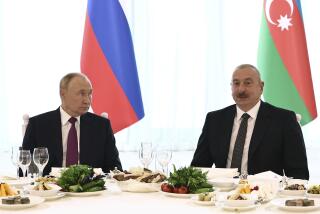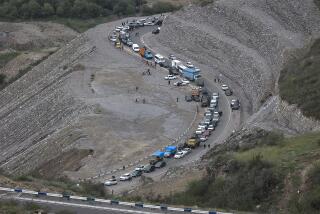Despite Appeals, Karabakh Battles Rage
- Share via
MOSCOW — Ignoring a cease-fire appeal by President Bush and Russian President Boris N. Yeltsin, Armenia and Azerbaijan attacked each other anew Monday in at least six places around the disputed mountainous enclave of Nagorno-Karabakh.
Armenia said that six of its combatants and two children were killed in fighting waged with warplanes, rockets and armored vehicles.
Both sides acknowledged the urgent call by the Russian and U.S. presidents Sunday for “an immediate end to the bloodshed.” But while an Armenian spokesman welcomed their proposal for renewed peace talks, Azerbaijan said only that it is being “thoroughly studied” and will likely have little impact.
“The Karabakh question will be resolved not in Moscow or in Washington but most likely on the battlefield,” Azerbaijan’s state secretary, Panakh Guseinov, told reporters in the capital of Baku, Russia’s Itar-Tass news agency reported.
The fighting in the Caucasus Mountains underscored the messy outcome of the Cold War with the Soviet Union’s collapse a year ago. As Bush and Yeltsin agreed during their two-day summit here to eliminate most of their nuclear arsenals, ethnic and religious conflicts raged along Russia’s southern edge, beyond the Kremlin’s weakened influence.
In Tajikistan, Communists are battling Islamic guerrillas in a civil war that has claimed thousands of lives in recent months. Moldova, another former Soviet republic, is torn by feuding between ethnic Russians and ethnic Romanians. Mountain people in the Russian enclaves of Ingushetia and Ossetia have clashed in a territorial dispute.
In yet another conflict, 17 people were reported killed Sunday and Monday in three clashes between troops of the former Soviet republic of Georgia and separatist forces in the Black Sea region of Abkhazia. The flare-up prompted Georgian President Eduard A. Shevardnadze to ask the U.N. Security Council to send peacekeepers.
The undeclared Armenia-Azerbaijan war, which pits Christians against Muslims, has claimed more than 3,000 lives and created half a million refugees in the past 4 1/2 years, the United Nations reports. Six cease-fires, the last arranged by Russia’s defense minister in September, have quickly broken down.
Because Russia and the United States both have close ties with Armenia, Yeltsin and Bush focused attention on what they called its “long and fierce hostilities” with Azerbaijan; the warfare causes “enormous damage to the economies of both countries and discredits democratic tendencies in their development,” the presidents said.
In a post-summit statement, they called for urgent Armenia-Azerbaijan peace talks by the Conference on Security and Cooperation in Europe.
Monday’s reports from the two warring countries brought more news of attacks on civilians in and around Nagorno-Karabakh, an enclave within Azerbaijan that is populated mostly by Armenians and lies at the heart of the conflict.
Guseinov, the Azerbaijani state secretary, said that Armenian forces shelled populated areas in the Azerbaijani regions of Agdam and Fizuli near the Nagorno-Karabakh border. Armenian officials said two children died and two were wounded when Azerbaijanis bombarded the town of Gadrut, which lies inside the enclave. Each side reported crippling attacks on the other’s tanks and armored personnel carriers.
Subways in Yerevan, the Armenian capital, ground to a halt Sunday in a war-related fuel crisis caused in part by blockades of natural gas to landlocked Armenia by Turkey, an ally of Azerbaijan.
More to Read
Sign up for Essential California
The most important California stories and recommendations in your inbox every morning.
You may occasionally receive promotional content from the Los Angeles Times.













